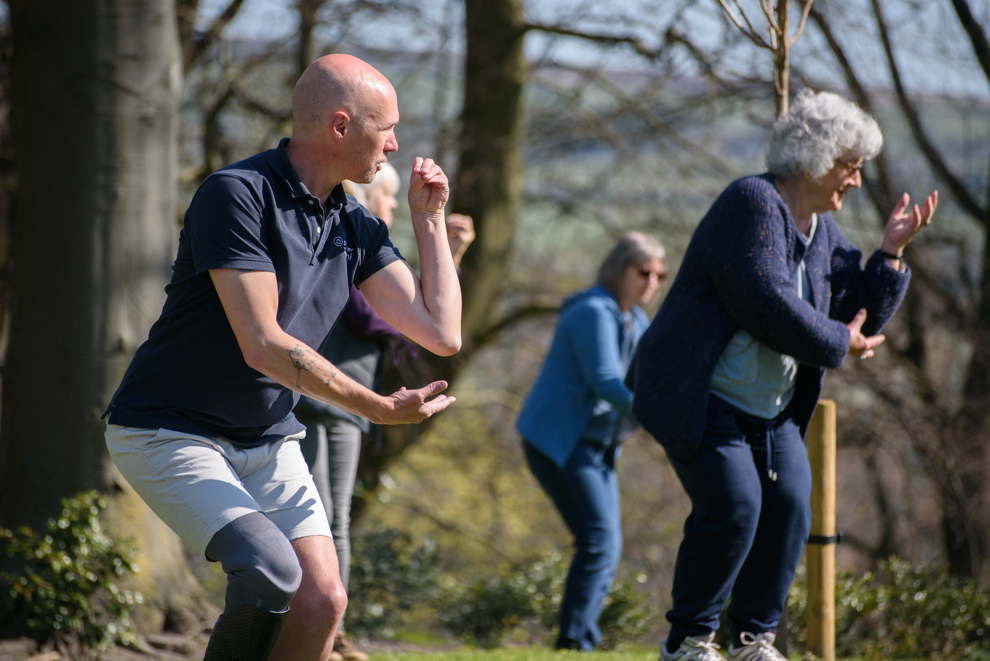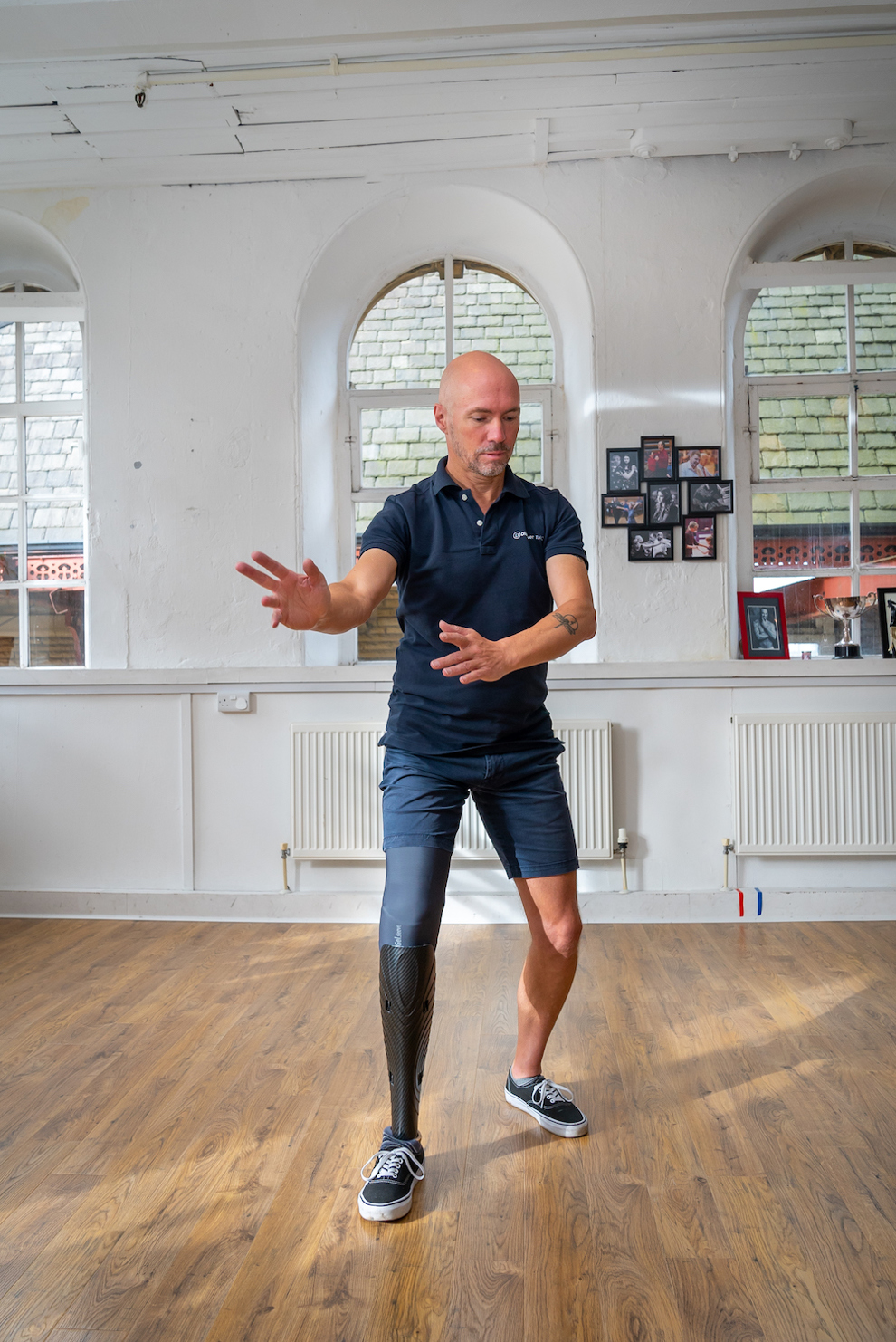Tai Chi with Blesma
When it comes to trying new activities, one of the common frustrations for anyone living with an amputation or loss of use of limb is finding an instructor who truly understands – and makes provision for – the special circumstances brought about by their injuries.
However, when they’re learning from Phil Sheridan, who co-owns Discover Tai Chi with Helen Parsons, that isn’t a problem. Phil is an amputee himself, having survived
a near-fatal road accident in 2002 that resulted in the amputation of his right leg below the knee.
“I was riding my motorbike and found myself under a 25-ton wagon – on Friday 13th!” he says.
“I had to hang in there for what turned out to be a gruesome three hours. My surgeon told me I shouldn’t be here.”
Phil’s story of recovery is one that many Members will be able to relate to – and he credits his return to a full life (at least in part) to his enduring love of martial arts, especially Tai Chi. The ancient Chinese practice has many forms – some with defensive and fighting qualities like Kung Fu – but it is better known for its slow-moving, flowing style that gives a meditational sense of relaxation and provides numerous health benefits. Tai Chi is also extremely good for improving flexibility, balance and mobility – important for any amputee – but many traditional classes don’t cater to those with limb loss or loss of use of limb.
That’s why Phil and Helen, who run their business from Keighley in Yorkshire, developed a programme especially for Blesma Members. They’re perfectly qualified for the task: Phil teaches at the University of Leeds, has studied martial arts for 37 years, and is an avid powerlifter; Helen is a registered occupational therapist who specialises in sports, health, exercise and nutrition – as well as being an enthusiastic martial artist herself. A number of Members recently signed up for blocks of 30-minute lessons, delivered via Zoom, and the results have already been extremely impressive.

Maintaining Stability
“After I was injured, I quickly realised the mental challenges I was going to face would be even more significant than the physical ones,” explains Phil. “That was behind the thinking for this course; we wanted to introduce people to Tai Chi’s fluidity and smoothness of movement, and also build in the relaxation elements. Once the Members slowed down and felt what was going on, they said they quickly found it very calming.”
The Members have been taught how to build up a series of movements, adding a new ‘form’ each week and steadily assimilating each move.
“We decided to go for half-hour sessions because we didn’t want to overload people,” explains Phil. “One of the more challenging aspects of living with limb loss is maintaining stability. One of the key benefits of Tai Chi is improving that, but it does come with discomfort and fatigue so you can’t overdo it. Helen and I used our skills as teachers and clinicians to strike a balance between the challenge and the pay-off.
“We explained to Members that the ethos of the sessions would be; ‘let’s explore what we can do’. There was no pressure to perform, and the Blesma Members grasped
that right away. They came to the classes with a healthy cynicism but were willing to give it a proper go. I remember from my own time in rehab that doing the work
is hard, but I always put in the time that my physios recommended and would do more exercises on my own, too.”
Helen says the fact the Blesma Members already shared a camaraderie and had things in common meant that it was easy to develop a good atmosphere in the classes.
“There was genuine banter and humour, which was really nice and very useful for the classes,” she says. “It meant there was a sense of community in the classroom
from the very first session, and that made life easier for Phil and I because we usually have to develop that with a new class.
“We often say that observation is as good as participation when you are starting out, but the Members gave us feedback immediately, and we liked that.”

“Some people have preconceived ideas about Tai Chi being mystical, and we’ve got to unpack all that, but the Members got it right away. I think their sense of humour
helped. I explained that, as strange as it might sound, I would be talking about our feet a lot, even though we might be missing them, and they were all fine with that,”
says Phil.
"We made a lot of progress quickly. They were fast learners and maybe that was because they’d done drill in the past. You have to repeat things again and again when you’re starting Tai Chi – lower your hand here, move it here – so maybe there’s a crossover with the military. When you’re learning to do something very slowly and precisely, it doesn’t harm that you’ve had a military or a technical job.”
A sense of Mastery
Phil and Helen are perfect adverts for the benefits of Tai Chi. They both look much younger than their actual ages (“we’re lucky with our genes,” thinks Phil) and exude enthusiasm for the practice.
“I’ve been passionate about martial arts since Bruce Lee and the Kung Fu craze in the 1970s,” says Phil, “and Tai Chi is both extremely accessible for any demographic
and has a meditation kind of sensibility. It also confers a sense of mastery that you don’t get from something like a Zumba class.
“After I had my accident, I carried on practicing Tai Chi – even when I was in my hospital bed – as part of my recovery. Rehab can be boring, and living with a long-term condition can be a slog, but I found that Tai Chi allowed me to keep making small gains.”
Helen’s background as an occupational therapist is brought into play during the classes, while Phil often discusses his own rehab with students. “I know that after an accident or injury, there’s not just a physical impact. I lost my career and my house. I lost friends, my family was ruptured...” he says. “This is often the case for Blesma Members, so I talk about next steps after injury. In a way, the injuries and surgeries are the easy bits. After all that, you need to figure out how to live again. That’s where organisations like Blesma can be extremely important for people. They recognise that they’re looking after the whole person, not just someone who needs help after a significant event. There’s a life-long commitment there, and they see that activities like ours can help.”
And the feedback from the course has been hugely positive. “Everyone has been incredibly generous,” says Helen. “It’s wonderful to hear people say the course is
really good, or that they feel much calmer and more relaxed, or that their balance has already begun to improve. And some have started to share what they’ve learned with their kids, grandchildren, or neighbours. That’s everything we would want to hear in such a short space of time. We’re offering more than just an exercise class!”
Tai Chi is proving to be one of the highest rated online activities that the Association has ever run. Applications are currently open for Members to join another six-week course in Tai Chi. To find out more, contact Clare on 020 3954 3021 or at aecal@blesma.org. Or Register for the event here.
Leave a comment
Join fellow Members and supporters to exchange information, advice and tips. Before commenting please read our terms of use for commenting on articles.